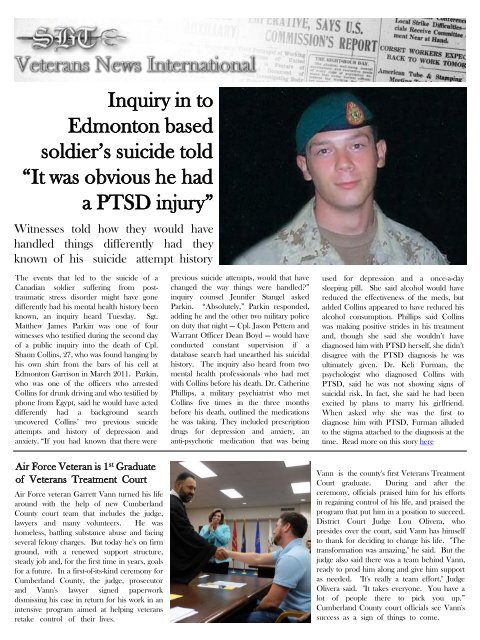You also want an ePaper? Increase the reach of your titles
YUMPU automatically turns print PDFs into web optimized ePapers that Google loves.
Inquiry in to<br />
Edmonton based<br />
soldier’s suicide told<br />
“It was obvious he had<br />
a PTSD injury”<br />
Witnesses told how they would have<br />
handled things differently had they<br />
known of his suicide attempt history<br />
<strong>The</strong> events that led to the suicide of a<br />
Canadian soldier suffering from posttraumatic<br />
stress disorder might have gone<br />
differently had his mental health history been<br />
known, an inquiry heard Tuesday. Sgt.<br />
Matthew James Parkin was one of four<br />
witnesses who testified during the second day<br />
of a public inquiry into the death of Cpl.<br />
Shaun Collins, 27, who was found hanging by<br />
his own shirt from the bars of his cell at<br />
Edmonton Garrison in March 2011. Parkin,<br />
who was one of the officers who arrested<br />
Collins for drunk driving and who testified by<br />
phone from Egypt, said he would have acted<br />
differently had a background search<br />
uncovered Collins’ two previous suicide<br />
attempts and history of depression and<br />
anxiety. “If you had known that there were<br />
previous suicide attempts, would that have<br />
changed the way things were handled?”<br />
inquiry counsel Jennifer Stangel asked<br />
Parkin. “Absolutely,” Parkin responded,<br />
adding he and the other two military police<br />
on duty that night — Cpl. Jason Pettem and<br />
Warrant Officer Dean Boyd — would have<br />
conducted constant supervision if a<br />
database search had unearthed his suicidal<br />
history. <strong>The</strong> inquiry also heard from two<br />
mental health professionals who had met<br />
with Collins before his death. Dr. Catherine<br />
Phillips, a military psychiatrist who met<br />
Collins five times in the three months<br />
before his death, outlined the medications<br />
he was taking. <strong>The</strong>y included prescription<br />
drugs for depression and anxiety, an<br />
anti-psychotic medication that was being<br />
used for depression and a once-a-day<br />
sleeping pill. She said alcohol would have<br />
reduced the effectiveness of the meds, but<br />
added Collins appeared to have reduced his<br />
alcohol consumption. Phillips said Collins<br />
was making positive strides in his treatment<br />
and, though she said she wouldn’t have<br />
diagnosed him with PTSD herself, she didn’t<br />
disagree with the PTSD diagnosis he was<br />
ultimately given. Dr. Keli Furman, the<br />
psychologist who diagnosed Collins with<br />
PTSD, said he was not showing signs of<br />
suicidal risk. In fact, she said he had been<br />
excited by plans to marry his girlfriend.<br />
When asked why she was the first to<br />
diagnose him with PTSD, Furman alluded<br />
to the stigma attached to the diagnosis at the<br />
time. Read more on this story here<br />
Air Force Veteran is 1 st Graduate<br />
of Veterans Treatment Court<br />
Air Force veteran Garrett Vann turned his life<br />
around with the help of new Cumberland<br />
County court team that includes the judge,<br />
lawyers and many volunteers. He was<br />
homeless, battling substance abuse and facing<br />
several felony charges. But today he's on firm<br />
ground, with a renewed support structure,<br />
steady job and, for the first time in years, goals<br />
for a future. In a first-of-its-kind ceremony for<br />
Cumberland County, the judge, prosecutor<br />
and Vann's lawyer signed paperwork<br />
dismissing his case in return for his work in an<br />
intensive program aimed at helping veterans<br />
retake control of their lives.<br />
Vann is the county's first Veterans Treatment<br />
Court graduate. During and after the<br />
ceremony, officials praised him for his efforts<br />
in regaining control of his life, and praised the<br />
program that put him in a position to succeed.<br />
District Court Judge Lou Olivera, who<br />
presides over the court, said Vann has himself<br />
to thank for deciding to change his life. "<strong>The</strong><br />
transformation was amazing," he said. But the<br />
judge also said there was a team behind Vann,<br />
ready to prod him along and give him support<br />
as needed. "It's really a team effort," Judge<br />
Olivera said. "It takes everyone. You have a<br />
lot of people there to pick you up.”<br />
Cumberland County court officials see Vann's<br />
success as a sign of things to come.


















